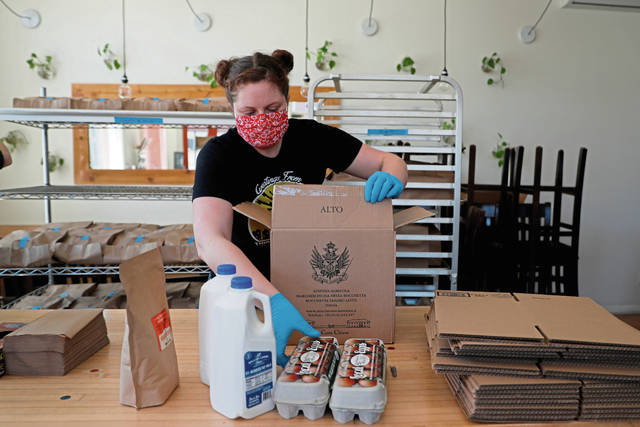The Carlton restaurant, a mainstay of Downtown Pittsburgh, has found a creative way to generate much-needed revenue since the coronavirus pandemic forced its closure.
Early this month, the upscale eatery in the BNY Mellon Center began curbside sales of wine from its extensive cellar.
It’s now offering packaged steaks, chicken breasts and pork chops that customers can take home and cook, along with cakes from its bakery subsidiary, Eadie’s.
“Folks can have a quality restaurant-style meal in their home,” said Kevin Joyce, the owner. “It’s nothing like being open for retail business, but it’s a little something to create some revenue. When you shut down revenue like that abruptly, you’re in a gigantic hole. This has allowed us to pay our local vendors, and now we’re paying our national vendors.”
The Food and Drug Administration generally doesn’t allow restaurants to sell food packaged for commercial use to the public.
But the pandemic pushed the FDA to ease such restrictions. Restaurants can sell bulk meats, bread, eggs and other staples to consumers. Food manufacturers can distribute bulk items packaged for restaurants to grocery stores.
State agriculture officials said food that’s already packaged would have to be trashed because restaurants mostly aren’t operating during the coronavirus pandemic.
“We’re trying to make sure that we don’t waste that food and make sure that we bring all of that food into the supply chain,” Pennsylvania Agriculture Secretary Russell Redding said Wednesday during a virtual press conference. “We want to make sure that the restaurants can use it, the grocery stores can use it the same time that the consumers feel safe that that item has gone through an inspection and is good to consume, but it may not be labeled as the household item would.”
Flats of eggs and large packages of pasta and soups are now appearing on grocery store shelves, said Shannon Powers, a spokeswoman for the state Department of Agriculture.
Restaurants across the state also are taking advantage of the relaxed regulations, said Melissa Bova, spokeswoman for the Pennsylvania Restaurant and Lodging Association.
“We have a lot of members who are doing this, where they’re selling these products almost in a grocery format,” she said. “It helps them be a little bit more creative by selling additional items.”
For the Carlton’s curbside service, customers must order in advance through the restaurant website.
“It’s been very successful,” Joyce said.
Some restaurant owners said they are focusing on takeout orders and haven’t considered selling uncooked items to go.
Josh Jones, owner of Marino’s American Eatery in Hempfield’s West Point neighborhood, said he doubts he’ll take advantage of the FDA regulation changes.
“I’m not sure if we’re going to look to do that because we’re struggling to run our full menu every day,” he said.
Mark Lubinsky, chef at the Firepit Wood Fired Grill in North Huntingdon, echoed Jones.
“Our only focus of this restaurant is providing what we can from our menu and cooking our food to order, so we really haven’t looked into or have discussed partaking in doing a mass production for consumers, especially in the North Huntingdon area,” he said. “It seems to be more of a trend for the Pittsburgh area than it is for rural Pennsylvania.”








